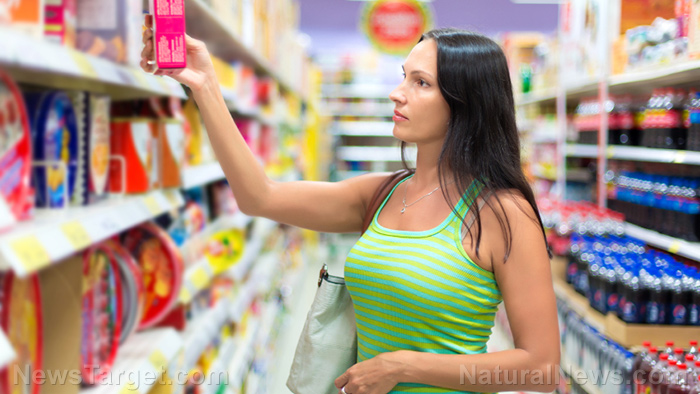 Parler
Parler Gab
Gab
- Texas' Senate Bill 25 proposes mandatory warning labels on foods containing 44 synthetic additives (e.g., artificial dyes, preservatives) linked to health risks like cancer, ADHD, and obesity. Products like Mountain Dew and Oreos could carry "not recommended for human consumption" labels.
- Over 60 major food companies, including PepsiCo and Kraft Heinz, oppose the bill, arguing it would harm local economies and confuse consumers. Critics question their resistance if the additives are truly safe.
- The bill highlights the gap between U.S. and EU food safety regulations. Many additives banned abroad (e.g., potassium bromate) remain legal in the U.S. due to industry self-certification as "generally recognized as safe."
- Texas' large population could force nationwide changes, similar to past state-led food labeling laws. Experts compare the potential shift to tobacco warning labels, driving demand for cleaner ingredients.
- Health advocates recommend avoiding synthetic additives (e.g., Red 40, BHA), choosing organic products, and prioritizing whole foods to reduce exposure to harmful chemicals.
Texas takes aim at toxic food additives in landmark bill that could reshape U.S. grocery aisles
A bold new bill in Texas could force food manufacturers to slap warning labels on popular snacks and beverages containing additives banned or restricted in other countries—potentially upending America’s grocery landscape. Senate Bill 25, advancing through the state legislature, targets 44 synthetic ingredients—from artificial dyes to preservatives—linked by research to health risks like hyperactivity, heart disease, and cancer. Products like Mountain Dew, Froot Loops, Oreos, and Skittles could soon bear labels declaring them "not recommended for human consumption." The proposal has sent shockwaves through the food industry. Within weeks of its introduction, over 60 major companies, including Kraft Heinz and PepsiCo, formed a coalition urging lawmakers to kill the bill, warning it would "destabilize local economies" and "confuse consumers." Critics argue the backlash reveals a telling contradiction: if these additives are safe, why oppose transparency? The bill highlights a stark divide in food safety standards. While the European Union bans or restricts many of these additives under the "precautionary principle"—requiring proof of safety before approval—the U.S. operates on a system where companies self-certify ingredients as "generally recognized as safe." This loophole has allowed substances like potassium bromate (a carcinogenic dough conditioner banned in the EU but common in U.S. bread) and synthetic dyes tied to childhood behavioral issues to remain ubiquitous. "American food ingredients are safe and have been rigorously studied," insists John Hewitt of the Consumer Brands Association. Yet scientists point to peer-reviewed studies connecting the bill’s targeted additives to rising rates of ADHD, obesity, and inflammatory diseases. With 31 million residents, Texas wields outsized influence. Past state-level food regulations—like Vermont’s GMO labeling law—have forced nationwide changes as companies opt for uniform packaging. If SB 25 passes, experts predict a domino effect. "Texas could spark the same revolution we saw with tobacco warnings," said Dr. Emily Carter, a public health researcher. "Once consumers see these labels, demand for cleaner ingredients will follow." While the bill faces fierce opposition, health advocates urge proactive steps:- Read labels: Avoid synthetic dyes (Red 40, Yellow 5), preservatives (BHT, BHA), and partially hydrogenated oils.
- Support organic: USDA-certified products ban many problematic additives.
- Boost detox pathways: Milk thistle and probiotics may mitigate chemical exposure.
- Simplify: Whole foods—fruits, vegetables, nuts—require no ingredient lists.
The fight ahead
The food industry’s aggressive pushback signals high stakes. Even if SB 25 passes, implementation could take years amid legal challenges. Yet the bipartisan support reflects growing public distrust of industrial food systems. "Consumers are waking up," said Texas State Sen. Charles Perry (R), a bill co-sponsor. "This isn’t about fear—it’s about the right to know what’s in your food." As the battle unfolds, Texas may prove that the most powerful tool against corporate influence isn’t just policy—but an informed public voting with their wallets. Tune your food news frequency to FoodSupply.news and get updates on more toxic foods and food ingredients invading every state but Texas. Sources for this article include: NaturalNews.com NaturalHealth365.comIsrael and Iran trade deadly strikes as nuclear talks collapse
By Cassie B. // Share
Vaccine incentives and Big Pharma power: A crisis of trust in modern medicine
By Willow Tohi // Share
Health Ranger Report: Matt Bracken discusses the American Empire’s looming COLLAPSE
By Kevin Hughes // Share
Sources: US will enter Israel’s war with Iran
By News Editors // Share
Poor sleep rewires teen brains, fueling aggression and rule-breaking, study warns
By Cassie B. // Share
Governments continue to obscure COVID-19 vaccine data amid rising concerns over excess deaths
By patricklewis // Share
Tech giant Microsoft backs EXTINCTION with its support of carbon capture programs
By ramontomeydw // Share
Germany to resume arms exports to Israel despite repeated ceasefire violations
By isabelle // Share










